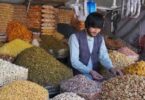Monitoring Desk
NEILI: Public health officials say the population of drug addicts more than doubled from 35,000 to 77,000 during the past four years in central Daikundi province, with females making 30 percent of the addicts.
Ishaq Ali Darman, Daikundi public health director, told Pajhwok Afghan News that last year’s investigations showed 15,000 or 20 percent of the 77,000 drug addicts consumed opium and around 61,000 (80 percent) consumed heroin.
Based to documents with the public health department, the number of drug addicts was 35,000 in 2015 but rose 77,000 in 2018, he said, adding more than 23,000 of the addicts were women.
He linked the increasing drug addiction to poverty, joblessness, Daikundi’s borders with Helmand and Uruzgan provinces where large areas of land are grown with poppy. Other factors include people’s return from Iran.
“Despite the increase in the number of drug addicts in Daikundi with each passing day, only one hospital is available for rehabilitation of addicts in the province, which has only 20 beds and is only for men,” he said.
Darman said 400 drug addicts were in waiting list for the last one month to be treated in the hospital.
Suhrab Ali Haidari, head of the 20-bed rehabilitation center, said the hospital started treating drug addicts five years ago.
The rehabilitation period for addicts was reduced from three months to one and half a months due to limited beds in the hospital, he said, adding that the hospital was able to rehabilitate 160 addicts a year.
“More than 400 people await their turn to be hospitalized each month due to shortage of resources and we do not have rehabilitation facilities for female addicts,” he added.
Reza Akhlaqi, provincial counternarcotics director, said no narcotics were grown in of Daikundi but its neighborhood with Helmand and Uruzgan provinces negatively impacted its people.
He said public awareness campaigns against narcotics use had been conducted in the province but a comprehensive program was required to totally solve the problem.
Khudadad, one of the drug addicts, said, “I was around 18 years old when poverty forced me to travel to Iran for work, I would try to work more than others and earn more money to rescue my family from hunger.”
“My boss would mix drugs in my food so I work without feeling tired, I also had no idea why I was energetic but later I released I was given narcotics” he said.
Gul Ahmad, another man who is addicted to drugs since four years, said that he had received his bachelor’s degree in agriculture but joblessness forced him to turn to narcotics.
Gul Naz, a 29 year-old woman and the mother of three children, is also addicted to drugs. She accused her husband of encouraging her to use drugs. “I am tired of this addiction, I have a strong will to treat myself if I find a place for that,” she said.
Laila Hussaini, a women’s rights activist in Daikundi, said that poverty, joblessness and migration were reasons that pushed people into drug addiction in the province.
She asked government officials to create a special rehabilitation center for female drug addicts in the province. (Pajhwok)






